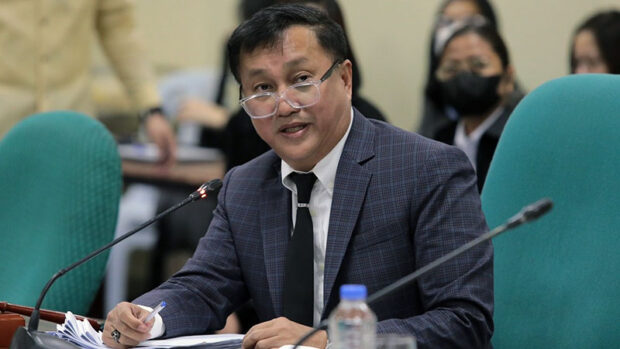MANILA, Philippines — The Department of Foreign Affairs (DFA) should take caution in reviving the government’s scuttled joint agreement with China to search for oil and gas in the West Philippine Sea (WPS), amid continued intrusions of Chinese vessels in Philippine waters, Sen. Francis Tolentino said on Sunday.
“For me, [the DFA] must slow down and be prudent because this could be a trap,” Tolentino, the vice chair of the Senate foreign relations committee, said in a radio interview.
“This could be abused and result in their bigger presence [in the West Philippine Sea],” he warned, referring to the Chinese ships making unlawful incursions in the country’s 370-kilometer exclusive economic zone (EEZ).
He said China may send more ships and personnel to the West Philippine Sea to fortify its presence in the area “under the guise” of conducting scientific marine research.
“On issues such as this, I think the Senate should be involved because this is an extension of foreign policy,” said the senator, who has a master’s degree in public international law.
Tolentino made the remarks after Foreign Secretary Enrique Manalo disclosed last week that the Philippines and China had agreed to return to the negotiating table to discuss the possibility of pursuing joint oil and gas exploration.
‘Planned talks’
In a GMA News interview on March 29, Manalo said the discussions between Manila and Beijing would begin in the next six weeks.
Barely a month before leaving Malacañang in June last year, then President Rodrigo Duterte ordered the DFA to terminate the memorandum of understanding (MOU) that the Philippines signed with China in November 2018 over sovereignty issues.
The deal had been intended to create a framework for future partnerships between both countries in exploring oil and gas resources in the West Philippine Sea, waters within the country’s EEZ in the disputed South China Sea.
Should the Philippines agree to resuscitate the agreement, Tolentino said it would be best for the DFA to be guided by a Supreme Court ruling that jettisoned a similar tripartite cooperation that the Philippines had entered into with China and Vietnam.
He was referring to the high tribunal’s Jan. 10 decision that voided the 2005 Joint Marine Seismic Undertaking (JMSU) among the three countries for flouting the 1987 Constitution.
In a vote of 12-2-1, the justices ruled that the JMSU was unconstitutional as it allowed “wholly-owned foreign corporations to participate in the exploration of the country’s natural resources without observing the safeguards provided in Section 2, Article XII of the 1987 Constitution.”
“In the planned talks with China, the provision of the Constitution regarding our exclusive economic zone should be considered,” Tolentino said.
Include arbitral ruling
The DFA, he added, should do its best to include a clear declaration in the agreement that “both parties will undertake to explore mineral seabed resources within the Philippines’ exclusive economic zone.”
“That would be better because it recognizes the arbitral ruling,” Tolentino said, referring to the Philippines’ 2016 victory in the international arbitration court in the Hague, Netherlands, that voided Beijing’s sweeping ownership claims in the South China Sea and recognized Manila’s sovereign right to fish and exploit resources in waters within its EEZ.
“The arbitral ruling should always be included in the negotiations along with [China’s] recognition of our exclusive economic zone.”
Beijing has refused to recognize the arbitral ruling.
In 2020, two years after the signing of the 2018 MOU, Duterte revived hopes for a joint exploration deal with China when he lifted a moratorium on energy projects in the West Philippine Sea.
His predecessor, Benigno Aquino III, imposed the ban in 2014 due to maritime tensions with Beijing.
In March 2022, Duterte said the Philippines must continue to honor its agreement with China to conduct joint exploration activities in the West Philippine Sea.
But the next month, the Department of Energy (DOE) suspended oil exploration activities, effectively putting a stop to such activities for Service Contracts 72 and 75 — two sites off Palawan province earlier identified by the government as possible areas of joint exploration with Beijing.
The DOE had sought the go-signal from the Cabinet-led Security, Justice and Peace Coordinating Cluster to continue the activities, but its members noted “the political, diplomatic and national security implications of any activity in the West Philippine Sea.”
As a result, PXP Energy Corp. and its subsidiary Forum Energy Ltd. — which had been hired by the government to conduct exploration activities — were forced to declare force majeure, or circumstances beyond their control, as the order prevented them from “performing their obligations.”
Other discussions
In June 2022, then Foreign Secretary Teodoro Locsin Jr. announced that the negotiations for the planned joint oil exploration between the Philippines and China in the West Philippine Sea had been completely terminated.
But by December, President Ferdinand Marcos Jr. said the Philippines was looking for other ways to explore for oil and gas in the West Philippine Sea, adding that his administration might veer away from government-to-government talks with China after discussions had reached a stalemate.
A month later, during the Marcos’ state visit to Beijing, the DFA said the Philippines and China had agreed to resume exploration discussions.
